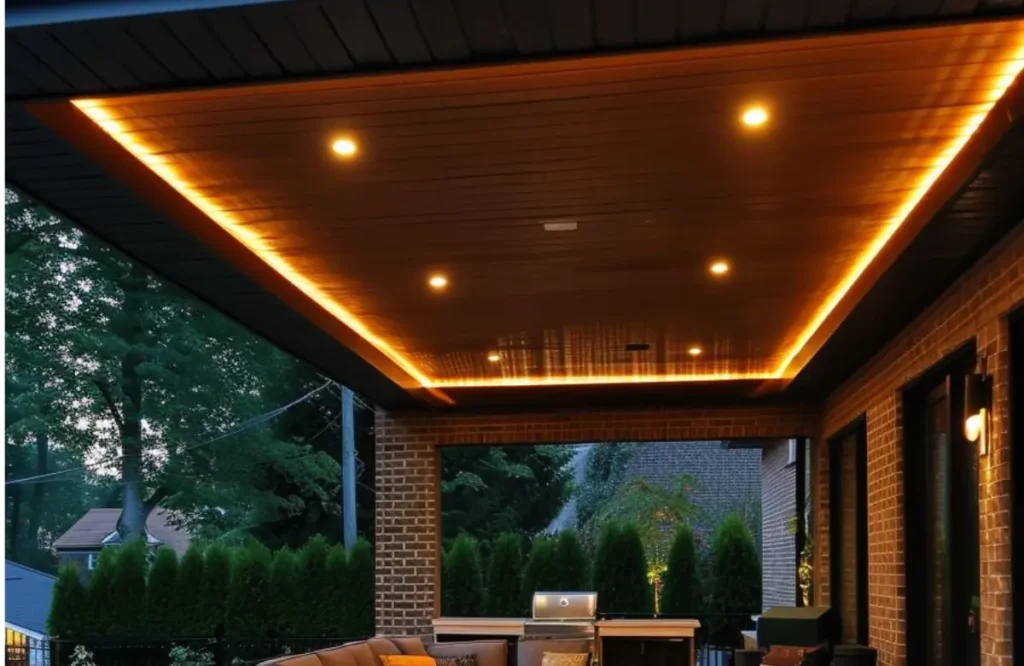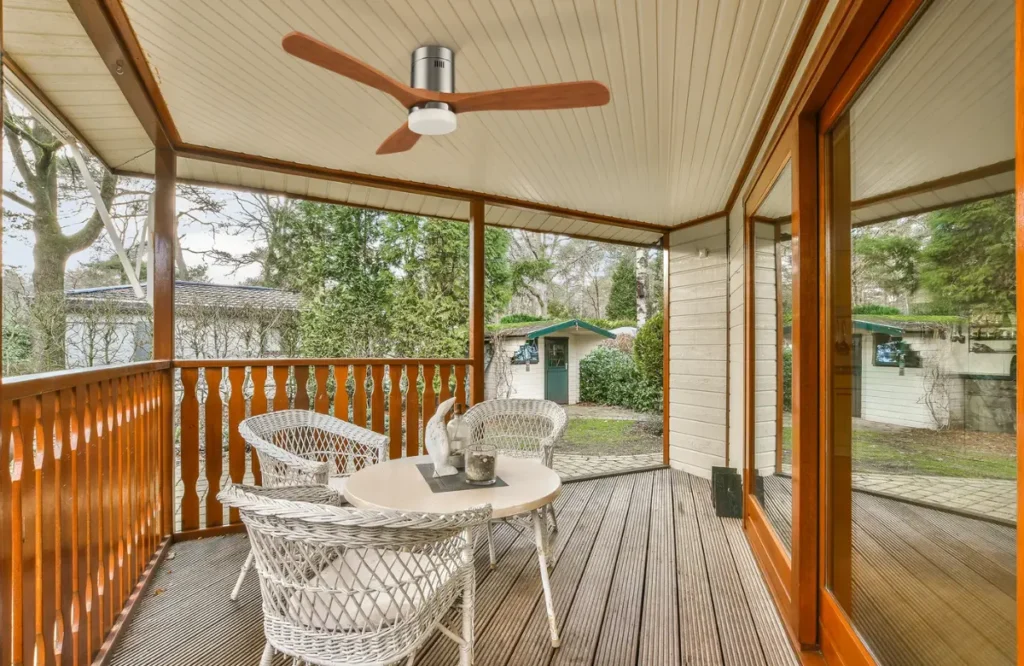Outdoor living areas such as patios, decks and verandahs are becoming increasingly popular as a recreational and entertainment place. These areas can be made comfortable with a good quality of outdoor ceiling fan. There are numerous options: weatherproof fans, outdoor standing fans waterproof, patio fans with light, and outdoor wet ceiling fans, therefore, it might be challenging to find the right one. This guide describes all you need to select the most ideal fan to fit in your area.
Why the Right Outdoor Ceiling Fan Matters
The right outdoor ceiling fans have dual benefits in nature as they can not only supply your outdoors environment with much needed air during a warm weather, but also rid your outdoors of invaders and promote fresh airflow as well as offer some aesthetic beauty to your outdoors decor. Compared to indoor fans, these fans have durability because they are built to withstand rain, humidity, sun, and wind. Do you require a metal ceiling fan outdoors or do you need a waterproof outdoor ceiling fan with lights? The choice of the right fan is mostly based on the type of environment you live in and how you intend to utilize it.
Factors to Consider When Choosing Your Outdoor Ceiling Fan
Choosing the right outdoor ceiling fan involves more than just picking a design that looks good. Several critical features influence how well the fan performs and how it fits into your outdoor space.
Size of the Fan
The blade span, or diameter, of the fan should correspond to the size of your outdoor area to provide optimal airflow and comfort.
- Small areas (≤75 ft²): 29–36 in. blade span
- Medium areas (76–144 ft²): 36–42 in.
- Large spaces (145–225 ft²): 44–50 in.
- Extra‑large spaces (>225 ft²): 50 in. or larger, or multiple fans.
The correct size will make sure it has efficient airflow without over-cooling or idle energy.
Lighting
Most fans already have lights built in, so you won’t need additional fixtures to cool and light up your patio. Use pick lights that are outdoor rated to last.
Control Options
The newest fans have remote control, wall switches, or smartphone applications. Smart systems have the capability of scheduling the speed and altering the color of the lights. Select the control method that fits your routine.
Energy Efficiency
DC motors provide high airpower at low power consumption and are quiet. An efficient fan saves electricity, especially during hot days.

Style
Fans can be rustic wood and metal or sleek in design. Choose a style that suits your taste and style.
Safety
Verify that the fan is properly rated for outdoor use:
- UL rating: wet, damp or weatherproof.
- Build firmly on a ceiling box of protection of outward type.
- Mount blades at least 7 ft. above the floor.
- Check that the fan will be placed in a secure place under the wind.
Wet vs. Damp vs. Weatherproof Fans
- Wet-rated: Sealed motor and blades; can be used where exposed to the weather in patios and pergolas.
- Damp-rated: Use on covered porches and gazebos; withstands moisture without being exposed to rain.
- Weatherproof: Typically resists rain, sun and wind; check the specific rating and materials.
| Feature | Wet-Rated Fans | Damp-Rated Fans | Weatherproof Fans |
| Exposure to Water | Direct rain and water exposure | Moisture, humidity, no direct rain | Moderate weather exposure |
| Blade Material | ABS plastic, waterproof | Sealed wood or composite | Varies (ABS or treated wood) |
| Motor Protection | Fully sealed, corrosion-resistant | Moisture-resistant but not fully sealed | Varies by manufacturer |
| Installation Locations | Uncovered patios, decks, pergolas | Covered porches, gazebos, screened patios | Covered or semi-covered spaces |
| Durability | High, withstands harsh weather | Moderate, for sheltered areas | Moderate |
| Design Options | Limited due to waterproofing | Wider variety, more decorative | Moderate |
| Cleaning | Hose washable | Wipe clean, avoid water spray | Varies |
| Typical Cost Range | $150 – $600+ | $100 – $500+ | $100 – $500+ |
How To install your Outdoor Rated Fan
Well installed outdoor ceiling fan is a necessary step because it ensures that it works safely and effectively and that it can withstand outdoor environment.
Ceiling Height Clearance
The majority of outdoor ceiling fans require a minimum of 7 feet of space between the blades and the floor in order to operate safely. This guarantees the sufficient airflow and maintenance of people and objects above the moving blades.
Use of Downrods
When your outside ceiling is above normal 8-9 feet, set a downrod to bring the fan to the ideal height where air moves. Downrods are available in a wide variety of lengths and outdoor materials.
Placement and Wind Exposure
Do not have fans installed where they are openly exposed to high or intense winds without some form of protection or windbreak. Syphonic wind may lead to wobbling or damages. Select an enclosed space (i. e. a covered porch, curtains on the windows or panels against the wind).
Electrical and Safety Compliance
To ensure that outdoor fans are not exposed to electric dangers, outdoor wiring must be carried out using outdoor-rated cables and must be fed to a GFCI-protected circuit. It is always necessary to have the fan attached to a ceiling box or support brace that should be rated as outdoors and be firmly attached to structural beams or joists that can support the weight and swing of the fan.
Follow Manufacturer Guidelines
Never fail to read the instructions by the manufacturer of the fans in terms of installation. These consist of assembling, connecting wiring, installing fittings, and special needs of your fan model.
Professional Installation
Where the work is uncertain or the mounting, then it is best to employ a licensed electrician or professional installer. Correct installation is a way of ensuring safety as well as prolonging the life of your fan and reducing the future problems of wobbling or noise.
With these important considerations when installing a ceiling fan, your outdoor ceiling fan will offer you many years of comforting and efficient air circulation and meet the conditions of outdoor living.
What Makes a Ceiling Fan Outdoor-Rated?

The selection of proper outdoor ceiling fan is a critical step to ensuring ultimate comfort, style, and longevity in your backyard. It can be a metal outdoor ceiling fan or a light outdoors in a waterproof outdoor fan, whichever it may be, spending on the right kind of outdoor fan which fits the surroundings will guarantee a few years of dependability and great looks. It should have:
- The outdoor ceiling fans must be built in a manner that is tough enough to withstand the weather.
- The blades are usually constructed of hardy substances such as ABS plastic, resin or specially pre-treated wood that does not warp, crack or fade away.
- Metal components of the fan are normally coated or galvanized against rust and corrosion.
- The motor is sealed and designed using corrosion resistant materials such that it can be used in wet or moist environment.
- Protective seals and covers ensure that moisture and debris do not get in contact with the motor, which ensures that they last longer and work reliably outdoors.
Knowing the various ratings will transform your outdoors into a home away from home. Book an appointment with All Star Construction Group and have a free consultation. Let our experienced Allow our seasoned personnel to deliver a stepwise plan and clear quote.
FAQs
Wet-rated fans are constructed to take care of rain or running water. Damp-rated fans are only to be installed in covered spaces.
Wet-rated fans can resist direct water hits, damp-rated fans can resist moisture and humidity but not direct hits of rain.
Yes, there are waterproof ones and they usually have an IPX4 or more rating.
There are numerous cooling/illumination light kits incorporated.
Find rust resistant metal, ABS plastic blades and enclosed motors.
No. Indoor fans are not moisture or UV resistant, and cannot be used outside.


